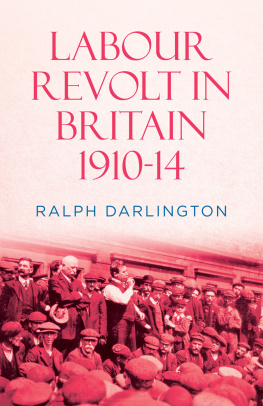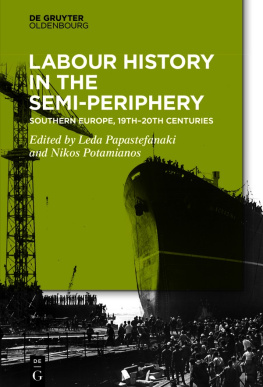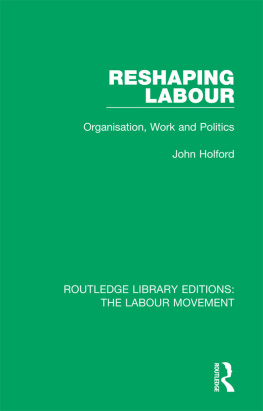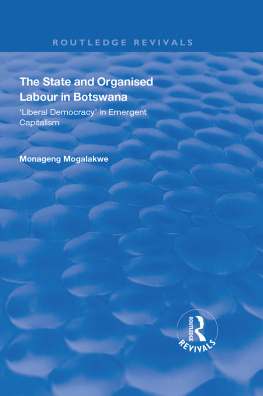The tide of democracy
Shipyard workers and social relations in Britain, 18701950
ALASTAIR J. REID
Copyright Alastair J. Reid 2010
The right of Alastair J. Reid to be identified as the author of this work has been asserted
by him in accordance with the Copyright, Designs and Patents Act 1988.
Published by Manchester University Press
Oxford Road, Manchester M13 9NR, UK
and Room 400, 175 Fifth Avenue, New York, NY 10010, USA
www.manchesteruniversitypress.co.uk
Distributed in the United States exclusively by
Palgrave Macmillan, 175 Fifth Avenue, New York,
NY 10010, USA
Distributed in Canada exclusively by
UBC Press, University of British Columbia, 2029 West Mall,
Vancouver, BC, Canada V6T 1Z2
British Library Cataloguing-in-Publication Data
A catalogue record for this book is available from the British Library
Library of Congress Cataloging-in-Publication Data applied for
ISBN 978 0 7190 8103 3
First published 2010
The publisher has no responsibility for the persistence or accuracy of URLs for any
external or third-party internet websites referred to in this book, and does not guarantee
that any content on such websites is, or will remain, accurate or appropriate.
Typeset in Sabon with Gill Sans display
by Graphicraft Limited, Hong Kong
Printed in Great Britain
by TJ International Ltd, Padstow
Contents
Figures
Acknowledgements
It is a great pleasure to be able to acknowledge now some of the debts I have accumulated during the many years of work on this book, focusing on the institutions and groups which have provided my immediate working environment, in the hope that my many other obligations have been sufficiently recognised in the references.
As an undergraduate, graduate and junior research fellow, I benefited enormously from the supportive atmosphere at Gonville and Caius College, Cambridge and would like to thank in particular my first two supervisors, Neil McKendrick and Vic Gatrell, for stimulating my interest in economic and social history; and also my graduate supervisor at nearby Kings College, Gareth Stedman Jones, for encouraging my interest in the combination of history with social theory. I was then very fortunate to be appointed to a fellowship at Girton College, Cambridge and it is hard to imagine a more congenial environment in which to carry out teaching and research: I would like to thank in particular my successive colleagues on the history staff, Betty Wood, Hazel Mills, Ben Griffin and Samantha Williams, for their close cooperation and friendship; and also Jenny Blackhurst and Andrew Leader for their unfailing helpfulness in providing technical support over the final hurdles.
The loneliness of this long-distance researcher was greatly eased by stimulating contact with a succession of networks of other specialists. First by the gathering of a group of graduate students for informal discussions in London which developed into a research project on shop-floor bargaining at Kings College, Cambridge: in these years I benefited especially from regular conversations with Jonathan Zeitlin, Steven Tolliday, Joseph Melling and Keith McClelland. A little later there was a similar gathering around the organisation of a conference on nineteenth-century radicalism at Churchill College, Cambridge during which I benefited especially from discussions with Eugenio Biagini, Pat Thane, Miles Taylor and Jon Lawrence. Finally, in the last stages of the preparation of this book the History and Policy Trade Union Forum has begun to bridge the gap between the academic and organisational worlds, and I have been especially encouraged by the supportive comments of James Moher and Peter Ackers.
This publication has been made possible by a grant from the Scouloudi Foundation in association with the Institute of Historical Research.
Towering over most of this process have been two presences it may seem rather incongruous to place side by side. For one is the very public one of the Cambridge University Library, the resources and staff of which could hardly be bettered for the study of modern British history. The other is a much more private one back at home, where Margaret Dyson has shown an unflagging sympathy and interest in this material at all hours of the day and night.
But it is also appropriate to go back before the beginning and remember my parents who provided the ideal start for an academic career, and so it is with deepest gratitude that this book is now dedicated to them: to my mother Jean and in memory of my father Jack.
Abbreviations
ABS | Associated Blacksmiths Society |
AESD | Association of Engineering and Shipbuilding Draughtsmen |
AEU | Amalgamated Engineering Union |
ASCJ | Amalgamated Society of Carpenters and Joiners |
ASE | Amalgamated Society of Engineers |
ASS | Associated Shipwrights Society |
ASW | Amalgamated Society of Woodworkers |
ASWM | Amalgamated Society of Woodcutting Machinists |
AUFW | Amalgamated Union of Foundry Workers |
BSP | British Socialist Party |
CSA | Clyde Shipbuilders Association |
EEF | Engineering Employers Federation |
ETU | Electrical Trades Union |
FEST | Federation of Engineering and Shipbuilding Trades |
GFTU | General Federation of Trade Unions |
ILP | Independent Labour Party |
LP | Labour Party |
LPEC | Labour Party Executive Committee |
LRC | Labour Representation Committee |
NASOHASPAD | National Amalgamated Society of Operative House and Ship Painters and Decorators |
NAUL | National Amalgamated Union of Labour |
NUFW | National Union of Foundry Workers |
PC | Parliamentary Committee (of the TUC) |
SDF | Social Democratic Federation |
SEF | Shipbuilding Employers Federation |
SPS | Scottish Painters Society |
TGWU | Transport and General Workers Union |
TNLU | Tyneside and National Labourers Union |
TUC | Trades Union Congress |
UOPA | United Operative Plumbers Association |
UPA | United Patternmakers Association |
|










